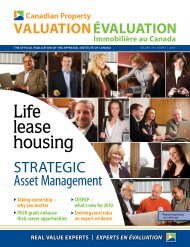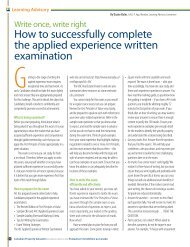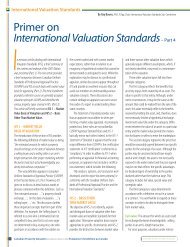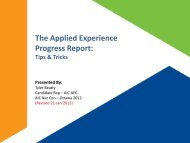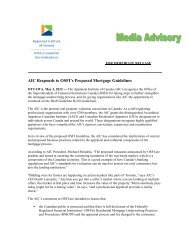Book 1 - Appraisal Institute of Canada
Book 1 - Appraisal Institute of Canada
Book 1 - Appraisal Institute of Canada
Create successful ePaper yourself
Turn your PDF publications into a flip-book with our unique Google optimized e-Paper software.
From the Counsellor’s Desk<br />
B y R o b e r t P a t c h e t t , L L . B , C D , A I C C o u n s e l l o r , P r o f e s s i o n a l P r a c t i c e<br />
Succession planning<br />
In my last article, I discussed<br />
the process <strong>of</strong> finding the right<br />
match in the co-signer/candidate<br />
relationship and some key factors<br />
to consider when negotiating the<br />
terms <strong>of</strong> this relationship. The same<br />
principles and factors are applicable<br />
to finding business partners and hiring<br />
employees. In this article, however, I<br />
would like to address the other end <strong>of</strong><br />
the spectrum – succession planning<br />
for your appraisal practice. After all,<br />
that next candidate that you hire, with<br />
a business commerce background,<br />
will bring new skills to your business,<br />
and may wish to eventually become<br />
a full partner who subsequently takes<br />
over the business when you retire.<br />
This is about training your successor<br />
and not necessarily your next competitor.<br />
If you are not thinking about<br />
retirement, then why do you need to<br />
consider this Succession planning,<br />
like estate planning, is about having<br />
control over what happens to your<br />
business. Prudent estate planning<br />
ensures who inherits your assets and<br />
36<br />
C a n a d i a n<br />
Appraiser<br />
Volume 51 • book 1 • 2007<br />
Evaluateur<br />
C a n a d i e n<br />
Succession<br />
planning,<br />
like estate<br />
planning, is<br />
about having<br />
control over<br />
what happens<br />
to your<br />
business.<br />
reduces the tax liability. Succession<br />
planning ensures the appraisal business<br />
that you have developed will<br />
continue long after you retire.<br />
A recent survey by the Canadian<br />
Federation <strong>of</strong> Independent Business<br />
indicates that at least one-third <strong>of</strong><br />
small and medium sized business<br />
owners plan to retire in the next five<br />
years. This is no surprise, since the<br />
first wave <strong>of</strong> <strong>Canada</strong>’s baby boom<br />
generation turned 60 years <strong>of</strong> age in<br />
2006.<br />
From the perspective <strong>of</strong> the<br />
<strong>Appraisal</strong> <strong>Institute</strong> <strong>of</strong> <strong>Canada</strong> (AIC),<br />
the upcoming retirement cycle can<br />
be predicted. The reality <strong>of</strong> an older<br />
membership (55% between the ages<br />
<strong>of</strong> 45 and 65) has been one motivating<br />
factor behind the recruitment<br />
element <strong>of</strong> the branding and promotion<br />
initiatives aimed at attracting new<br />
members. It is essential that these<br />
people join the <strong>Institute</strong> during a timeframe<br />
when the experienced mentors<br />
are still active in AIC and available to<br />
develop and train these successors.<br />
For the business owner, succession<br />
planning has multiple benefits.<br />
It can grow your business and secure<br />
your retirement income; thus letting you<br />
ease into retirement. It can also provide<br />
for someone to take over the operation<br />
<strong>of</strong> your business should something such<br />
as illness happen to you today.<br />
The key is to incorporate a succession<br />
component into your business<br />
plan. If your plan is to have a family<br />
member take over the business, then<br />
get them involved early. If you plan to<br />
sell your interest to your partners, make<br />
sure that is included in the partnership<br />
agreement. Three critical steps – identify<br />
your successor, train your successor,<br />
and, when you are ready, transfer<br />
ownership.<br />
From a Standards perspective,<br />
you must consider Ethics Rule 4.2.9<br />
and the requirement for an appraiser<br />
to have access to pertinent records.<br />
When you sell your business, you may<br />
sell your records. Thus, the purchase<br />
and sale agreement should provide<br />
for access to the records for insurance<br />
claims purposes. Additionally, a<br />
potential purchaser will not assume<br />
your liability. Accordingly, it is expedient<br />
to secure tail coverage, which provides<br />
you with insurance protection during<br />
your retirement.<br />
Another consideration is your own<br />
ongoing consulting relationship with<br />
the new owners, in a mentoring and<br />
advisory capacity. It was your reputation<br />
that built the business and your<br />
continued association with your successors<br />
will assist them in preserving and<br />
expanding on that.<br />
Finally, when considering your plans<br />
for succession, just as you expect to be<br />
consulted in areas <strong>of</strong> your expertise, I<br />
would similarly encourage you to consult<br />
specialists such as a financial planner,<br />
lawyer, tax accountant or business<br />
valuator to assist you with this important<br />
aspect <strong>of</strong> your business plan.






